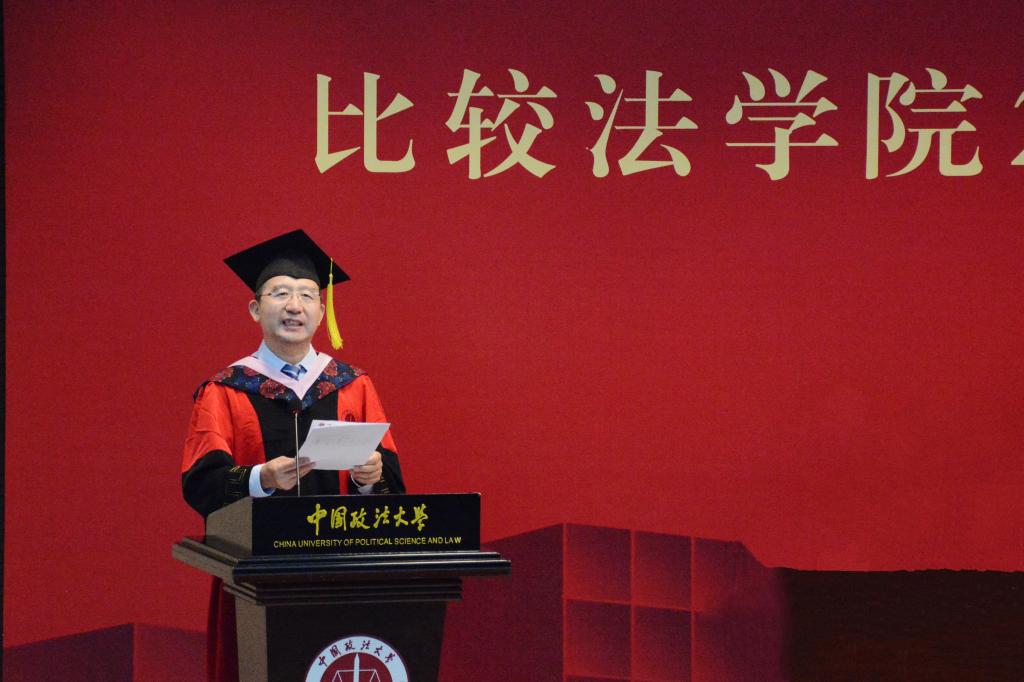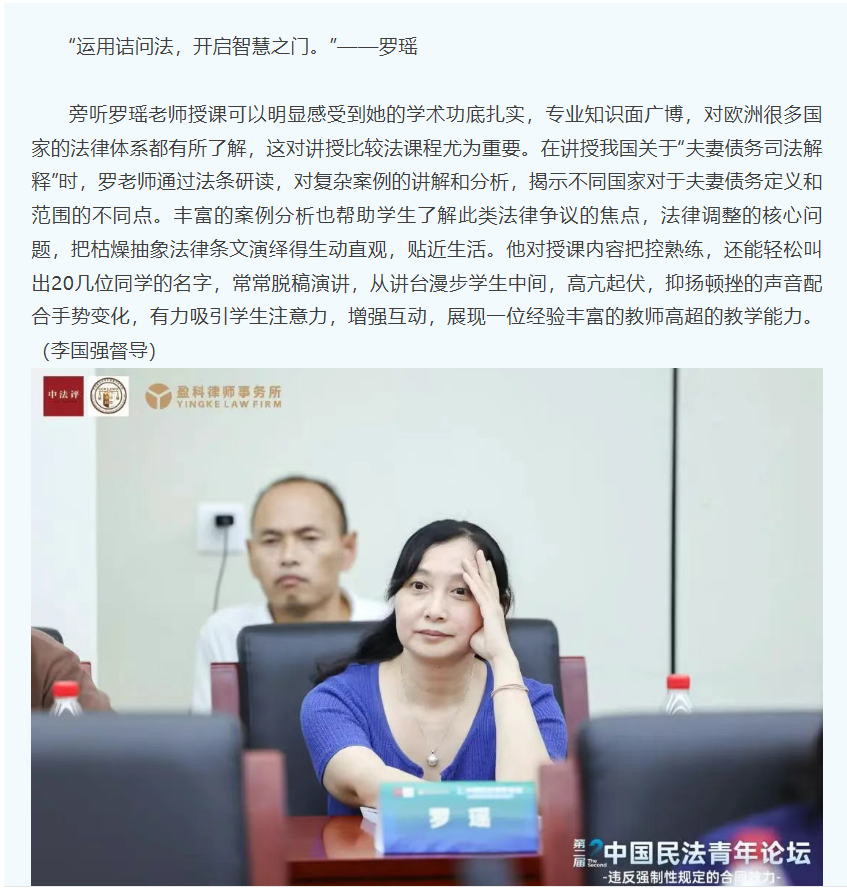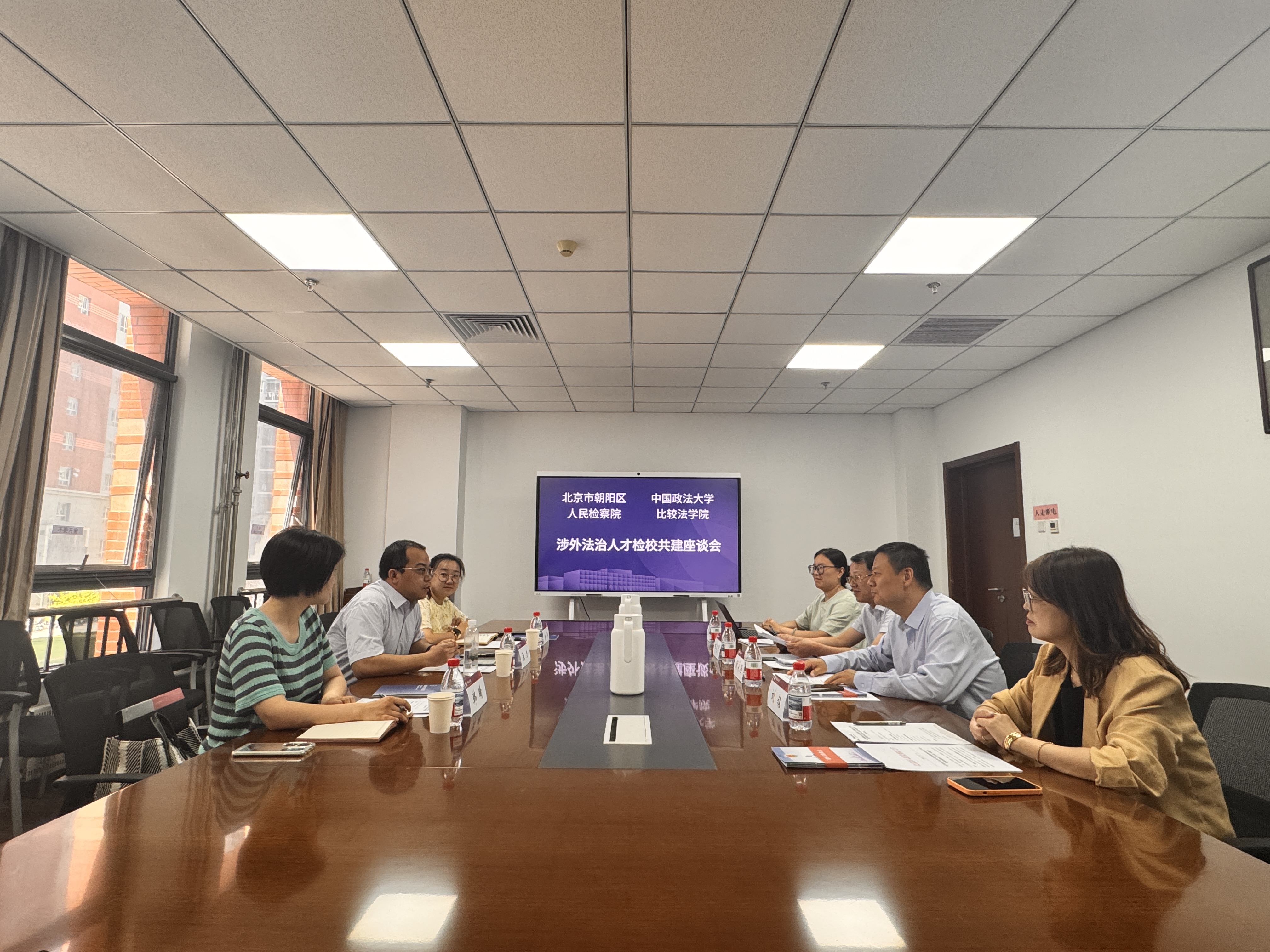
Dear graduates of the Class of 2025,
Respected faculty members,
Honoured families and friends,
Today, with immense pride and joy, we gather to celebrate the first commencement ceremony under the newly renamed School of Comparative Law. This historic moment marks our formal transformation from the College of Comparative Law—long dedicated to research excellence—into a full-fledged law faculty within CUPL, entrusted with the missions of education, research, and cultural inheritance. We are now officially one of CUPL's five law schools. Though we may still be young, we are growing, and we will continue to grow!
Notably, our college has earned the university's highest 'Excellent' rating in the annual performance evaluation for four consecutive years. This remarkable achievement is a testament to the academic legacy, educational quality, and innovative vitality of our entire faculty and student body.
Today, we witness the proud graduation of 97 brilliant scholars in comparative law—86 master's students and 11 doctoral candidates—embarking on new chapters of their journeys. On behalf of the entire college, I extend my warmest congratulations and best wishes to all graduates. I also wish to express my deepest respect and heartfelt thanks to the dedicated teachers and supportive families who have guided and stood by you along the way.
This year's graduating class has achieved impressive results. Some of you are advancing to top universities such as Peking University to pursue further academic excellence. Four graduates will soon begin work in central government ministries, contributing to the building of the rule of law in China. Many others have chosen careers as local civil servants, in public institutions, major state-owned enterprises, law firms, or legal departments of both public and private entities. We are especially proud of the academic distinction shown by students like Deng Shen, recipient of the Jiang Ping Scholarship, and Ge Jiawei, who was awarded First Prize for an outstanding paper by the China Association for the Study of Legal History. Moreover, more than half of our students in the Internationalised Legal Talent Experimental Programme have secured positions involving foreign-related legal work—clear proof of our success in cultivating much-needed high-end professionals for foreign-related rule of law.
Dear students, all that has passed is prologue. The words comparative law are now etched into your academic identity—they mark the beginning of your intellectual journey and will remain the distinctive hue of your life's path. Today, as you prepare to set out, I would like to share a few reflections under the theme 'Embarking on a Life of Comparison'. These thoughts are both a summary of your legal training and an expression of our aspirations for your future.
First: Let comparison become your intellectual identity.
For each of you, comparison is no longer merely a subject or a method—it has become your internal compass. It shapes how you observe the world and analyse problems. Through years of study, you've learned to move beyond single perspectives and to place legal systems, institutions, and cultural traditions in comparative dialogue. This comparative way of thinking is your academic fingerprint. Wear it with pride. It is your quiet strength in the information age, your ability to remain clear-headed amidst noise, and your key to openness in a world of clashing ideas.
Second: Let comparison guide you toward truth.
In rational discourse, we say "listening to all sides leads to clarity"; in science, we speak of induction, deduction, and falsification; in philosophy, we rely on verification and refutation. The essence of comparative law lies in drawing on multiple frames of reference and engaging in deep analysis to approach the underlying principles and logic of law. This is what Professor Jiang Ping meant by "truth comes from comparison".
Through comparison, we can discern the strengths and limitations of legal systems, assess the adaptability of rules, and navigate value conflicts. The same holds true in life: there is no absolute 'best'—only what suits you best. Comparing life paths, values, and choices is not about imitation or rejection, but about identifying your truest self through critical discernment. Remember, wisdom is not about rigid conviction but the insight gained from constant reflection and contrast. Our 'Four Confidences' (confidence in our path, theory, system, and culture) were forged precisely through such global and historical comparison.
Third: Let comparison lead you to wisdom in life.
Life rarely offers simple right-or-wrong choices. True wisdom—the ability to choose well—often lies in careful comparison. At life's crossroads, whether facing career decisions, value dilemmas, or personal trade-offs, broaden your vision and think deeply. Look sideways: what do the options offer in terms of risks and rewards? Look backward: what have your experiences and others' stories taught you? Look inward: how do career, family, responsibility, and passion weigh in your personal equation?
As my mother often reminded me: don't rush to decide—haste makes mistakes. Life is not about chasing the only right answer; it's about staying composed. In strategy, this is called 'strategic patience'; for ordinary people, it's simply letting the "bullet fly a little longer". Wisdom lies in this process of reflective comparison—in anchoring your path with foresight and balance. Let comparison be your internal compass, helping you stay grounded in a noisy world.
Fourth: Let comparison become your lifelong habit.
Graduation is not the end of learning, but rather the beginning of a more advanced journey of continuous learning and practice. Just as contemporary comparative law has evolved beyond mere institutional comparisons toward deeper inquiries into legal values, functions, and contextual adaptability, so too should you develop comparison into a lifelong intellectual habit—one that informs how you read the world, weigh your choices, and adapt to change.
In your professional work, this means remaining alert to different models and standards, drawing from global experiences to inform local practices, and maintaining humility in the face of legal pluralism. In everyday life, it means resisting one-size-fits-all thinking, appreciating diversity in thought and behaviour, and learning from alternative ways of doing and being. Whether you become a scholar, a civil servant, a lawyer, or an entrepreneur, this comparative habit will sharpen your judgment, nurture empathy, and enhance your problem-solving abilities.
Cultivating this habit is not about blindly pursuing novelty, but about grounding yourself in a deeper, broader, and more resilient view of the world. As you encounter the complexities of global governance, technological transformation, and legal reform, your comparative perspective will help you remain not only relevant, but also wise and visionary.
Dear graduates, today marks both an ending and a new beginning. You are stepping out from the walls of the College of Comparative Law—not to abandon the comparative spirit, but to carry it forward into new arenas. From your days in classrooms filled with questions to nights immersed in cases, codes, and commentaries, you have cultivated not only knowledge, but also the method, mindset, and mission of comparative legal inquiry.
Let 'comparison' remain not just a skill, but a way of life. Let it remind you that understanding requires contrast, that truth emerges through dialogue, and that wisdom is forged in discernment. As you navigate the unknowns ahead, may the compass of comparison guide you through complexity, toward clarity.
On behalf of the entire College of Comparative Law, I once again extend my heartfelt congratulations. May you remain courageous in conviction, humble in learning, generous in heart, and brilliant in all your pursuits.
Bon voyage on your comparative journey. May it be rich, meaningful, and worthy of your talents.
Thank you!












